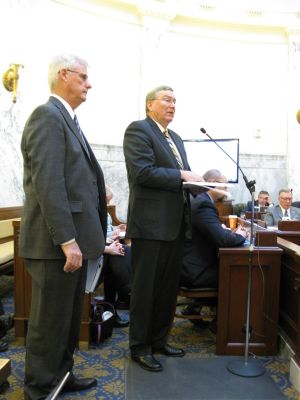Speaker, pro-tem request $8M for possible settlement in IEN case; JFAC backs, 19-1
House Speaker Scott Bedke and Senate President Pro-Tem Brent Hill came to JFAC today to request an $8 million transfer to the Legislative Legal Defense Fund to cover a possible settlement with the vendors in the Idaho Education Network case. JFAC members had lots of questions. The money would come from the state general fund; any portion of it not needed for the settlement would go to ongoing sage grouse litigation against the federal government.
After much discussion, the joint budget committee voted 19-1 in favor of the transfer, with just Rep. Phylis King, D-Boise, dissenting.
“This additional money would be used for our ability to react to the lawsuit,” Bedke told JFAC. “And it’s no secret to anyone that there have been attempts to settle this lawsuit. Those attempts continue, but we’re going to sine die. ... This gives us an ability to react to what we don’t know, I guess, going down the road. I would remind the group that from day one, there was never going to be a good way out.”
Bedke said lawmakers already have agreed to pay nearly $1 million for the legal fees of Syringa Networks, the winning party in the case, after the state’s $60 million contract for the IEN was ruled illegal. Education Networks of America and Qwest, now CenturyLink, have filed tort claims against the state for $11 million, saying the state stopped paying them while they still were providing services and they believe they’re due payment; but state law forbids making payments on an illegal contract. Idaho also has spent $1.1 million on its own unsuccessful legal defense in the case. There’s a third possible cost looming, Bedke said, if the federal government requires repayment of federal e-rate funds paid out for the project. “That deals with USAC and the FCC,” he said. “Those are outstanding and those are outside of this issue before you today.”
“We maintain that there has never been fraud, waste or abuse, and we feel like we can defend ourselves against that standard against the FCC,” Bedke said. “I think it’s in all our interest to get this behind us ... and that we can get back to a more normal relationship as we go forward with the e-rate.” Idaho schools are applying for e-rate funds on their own, now that they’re contracting for school broadband services separately, rather than through the IEN, and seeing big savings.
Sen. Dan Schmidt, D-Moscow, asked, “Would not the payments that were received from the federal government to the contractor need to be recovered from the contractor, should that shoe drop?”
Bedke responded, “I am not a lawyer, yet this is not my first rodeo. And so your points I think are valid. My position has always been that we received goods and services I think in good faith from vendors. And we paid them, up them until we didn’t. If we don’t pay them and those moneys are clawed back, then there is still arguably an obligation, and the accompanying tort claims have been filed to recover that. So settlement again seems to be the most prudent way out of this, and that’s’ what you’ll find me and Sen. Hill and others trying to do, is to settle this in a way that is responsible to the law and is responsible to the taxpayer.” You can read a full report here from the Associated Press.
JFAC Co-Chair Rep. Maxine Bell, R-Jerome, said she views settlement as the right move. “It’s egg on the face of the state, and I want it cleaned off,” she said after the JFAC meeting. “In the end, it’s about getting all of the schools broadband. … One thing about us, after doing everything else, we can do the right thing.”

